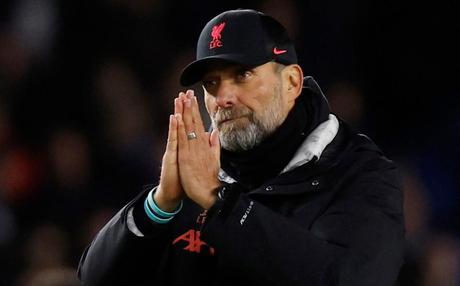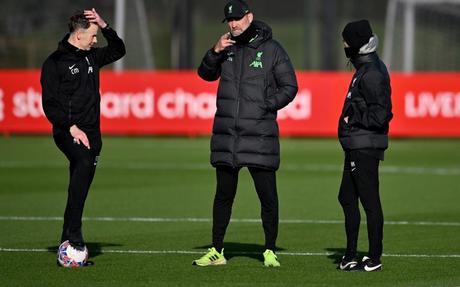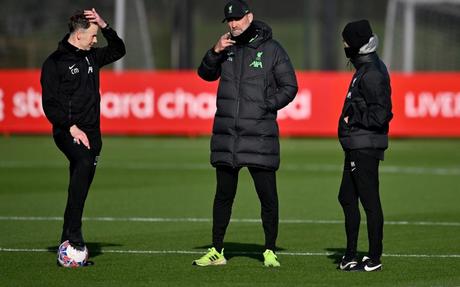
As with all major departing managers, the ultimate blame for Jurgen Klopp's departure lies squarely with the players.
The crucial difference in Liverpool's case is that he told them they were too good sooner than he expected. Time will tell if Klopp's latest big decision at Anfield is right, but he no longer believes they need him like they used to.
Klopp gathered his squad at the training ground shortly before 10.30am on Friday to deliver the news he first gave to Fenway Sports Group president Michael Gordon in November.
As is often the case with Klopp, the speech was partly instinctive, partly pre-planned.
He told the players that he would only leave Liverpool in a strong position. If he thought more work was needed to restore them to the position of title challengers or major trophy winners, a sense of unfinished business would have put him in charge. There was a strong indication that he would have gone sooner had it not been for the turbulence of last season.
Now Klopp is confident he will leave a legacy to be proud of, rather than a new-build project for his successor.
Klopp had been carrying his secret for two months. He's relieved it's open. The strange timing can be explained because once Klopp's coaching staff knew and started making plans for their next stint, word was bound to leak.
The same can be said when Liverpool inevitably start calling the representative of the manager they are looking to headhunt, assuming they haven't already, even though Xabi Alonso's most recent press conference bore all the hallmarks of a clever coach who chose him. words carefully.
In the November interview he was asked whether he would change his mind
Klopp's first call to Gordon before the Christmas schedule gave no clue as to what was about to happen. He merely asked for additional time to discuss an important topic at their next meeting. At that time he told him that Liverpool will need a new coach in the summer of 2024.
Gordon asked if there was any chance he would change his mind.
The story continues
When the answer was no, the director who will lead the search for Klopp's successor expressed his deep gratitude for the incredible work in rebuilding Liverpool. Gordon knows Klopp well enough that he is a man of his word, even if in this case it was the opposite of what the club wanted to hear.
Liverpool chief Billy Hogan reflected the shock in the city as he sat next to Klopp at Friday's press conference. But within Fenway Sports Group, that doesn't mean they are completely surprised, or had no idea such a day would come.
When Klopp signed his latest contract extension in 2022 - a four-year deal that would run until 2026 - he said he intended to see it through.
But that is the strength of his relationship with Gordon, chairman Tom Werner and principal owner John W Henry. Part of their negotiations was an open dialogue where Klopp would be honest enough to say when the time was right, regardless of the year the deal was made. .
A long-term contract gives the manager and the club room to breathe without the media or supporters monitoring future talks.
Bulletproof from the owners, but last season took its toll
For those who believe there must be more to the story - Klopp refuted some of the wild theories about ongoing transfer frustration during Friday's press conference - you may wonder why the manager's words about running out of petrol and needing a pause cannot be taken at face value.
Last season's efforts took their toll, especially when he was constantly asked to provide a detailed account of what was inexplicable even to Klopp.
He misjudged the speed at which his midfield would refuel. Consequently, it took him more energy than he intended to explain it publicly and then resolve it.
Whatever Klopp's personal thoughts, he has a policy of never openly criticizing his players' performances. Taking on so much blame for the team's failure to finish in the top four exhausted him more than he and others imagined - even though he had the internal support of his board and the enduring love for the Kop.
Whatever Klopp discovered during that period, no matter how poor Liverpool performed, he was bulletproof when it came to the owners and supporters. Firing him was never on the agenda. The only way Klopp could ever leave Liverpool was on his own terms.
That sounds like the ultimate blessing. In a world where Jose Mourinho's severance payments amount to £80 million, this could also be considered a curse.
While failed managers are led out the back door, Klopp explained up front that he will least miss such tiring press conferences if he takes at least a year off.
Like Bill Shankly in 1974 and Kenny Dalglish in 1991, there were no clear indications of this announcement. Not off the field, at least.
And yet perhaps there were. Ask those closest to Klopp about his management style this season and they have noticed a difference.
There has been more willingness to take risks in team selections and changes; even more eager to bleed Academy players, and on the training ground a few days ago someone was heard remarking 'he's doing it like it's his last year', even though they were completely unaware of how accurate the observation was .


Klopp's biggest concern as he informed the squad he was leaving was that his words could sap the energy from his group, even as he insisted he is 'all in' for the rest of this season.
Moments after they finished training, Klopp walked past the dressing room, dreading a somber silence. Instead, he heard jovial voices speaking about their determination to make this a season to remember.
Klopp's work at Liverpool is not quite done yet, but at that point he was even more convinced that he had done enough of the hard work to ensure that the long farewell would become a joyful sprint in search of more emotionally charged celebrations.
